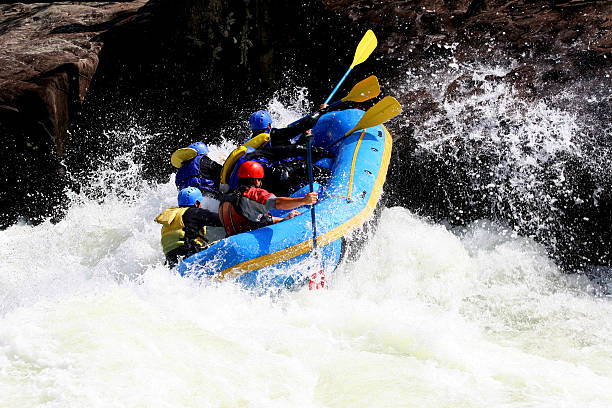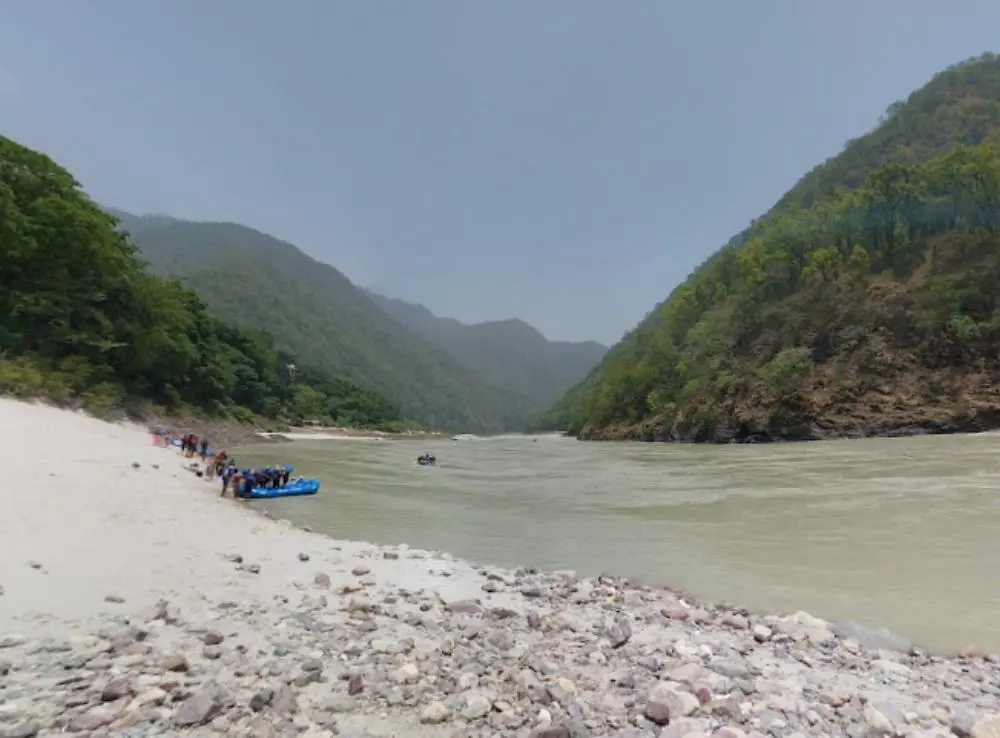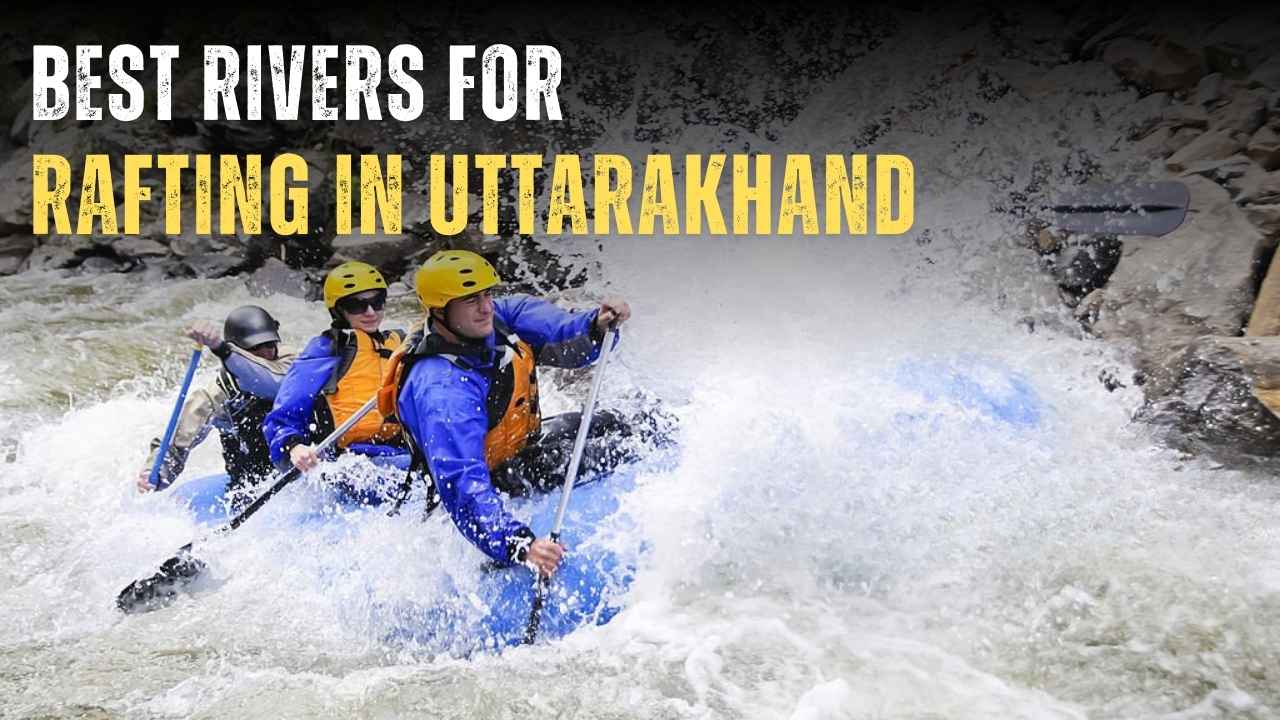Imagine, you along with your friends are in a raft and it feels like running, jumping and rolling over the surface of the river. Suddenly your eyes would shine and your heart would be filled with an exciting, happy, and energetic vibe. Rafting being a water adventurous sport seems exactly like this. But, it appears more joyous, when you do rafting in the rivers surrounded by beautiful landscapes. And for this kinda rafting experience, the rivers in Uttarakhand are one of the perfect choices. Yes, Uttarakhand is not only a hub for trekking destinations but also offers thrilling experiences with its rivers. The pleasant weather, playful young river streams, and eye-catching views make the overall experience of river rafting in Uttarakhand a boom.

Considering the rising adventurous spirit of youngsters, here in this blog, we are going to share the Best River for Rafting in Uttarakhand and other useful information.
Table of Contents
What is Rafting
Rafting is an adventurous activity performed on the surface of the river, with the help of a raft. A raft is basically a boat-like structure, made of inflatable material. So, a raft is used to cross the river. In this, a group of individuals wearing life jackets sit and navigate in the river by using paddles in a certain way. When this rafting is performed by the group of friends, the water splashes makes noise, the raft moves forward, they get goosebumps and overall it seems like a shot of refreshing, energetic, dopamine-releasing activity.
Further, the rafting experience varies on the basis of water level, and water flow.
Best Rivers for Rafting
1. Alaknanda River:
The Alaknanda River is quite famous for offering the best rafting experience in Uttarakhand. Several tourists come especially to raft in the Upper stretches of the river. The primary reason behind the Alaknanda River being most in demand for this water sport is its surroundings, which unveil mesmerizing views of the gorges, forests, and valleys.
Some popular riding stretches in the river are:
1.1 Nandaprayag to Karnaprayag:
This riveting water activity starts from the Nandaprayag where the Alaknanda confluences with the Nandakini River. Initially, you’ll be taught some basic practices and then rafting will shortly set in motion. On the way, you’ll get to see Hillary Falls, which will make this affair more amusing. After 5 hours of rafting, it will end in the Karnaprayag, the meeting point of Alaknanda and Pindar River.
1.2 Karnaprayag to Gauchar
There is another rafting stretch that you can include in your itinerary which commences from the Karnprayag and takes you through the white-gushing water of Alaknanda. This water sports adventure till Gauchar can also be a lifetime memory where you’ll come across beautiful, serene banks at Gauchar.
2. Ganges River:
Another major river that excites travellers to indulge in River rafting is the Ganges in Rishikesh. In this river, there are particularly four stretches where rafting services are operated for enthusiasts. These are:
2.1 Brahmapuri
The ride starts from Brahmapuri and completes a stretch of 10 km ending at Ranjhula. You’ll also enjoy cliff jumping as well as body surfing with almost 4 rapid rounds.
2.2 Shivpuri
This one starts at Shivpuri and includes a stretch of 16 km which takes almost half a day to complete. With sufficient time on hand, the rafter entirely savours the sport to its full capacity. Besides, the fast-flowing water stream adds more thrill to it. It ends at Laxman Jhula.

2.3 Marine Drive
The Marine Drive point spans around 25-26 km of rafting, and due to its difficulty level, it is under Grade III. However, Marine Drive is being enjoyed the most with the aid of professional guides. It includes almost 10 rapids. It runs from Marine Beach to Laxman Jhula.
2.4 Kaudiyala
The longest and toughest river rafting in Rishikesh begins from Kaudiyala and covers 3 km of rafting. However, there is some confusion regarding the length given for rafting, which isn’t sure. This span offers you Grade III-IV level of rapids and requires almost 8-9 hours. Its major rapids are Daniel Dip and the Great Wall.
3. Kali River
One of the many holy rivers in Uttarakhand, Kali River, also proposes this water activity called river rafting. To begin with this course, you’ll have to come to Pithoragarh. The Kali River expedition involves multiple starting and ending points. Some of those are:
3.1 Jhulaghat
After driving from Pittoragarh to Jhulaghat, you can kick-start your rafting journey from here. It encompasses a 15 km stretch and along your way, you’ll witness the formation of numerous stalactites and Stalagmites on its bank.
3.2 Chaukidhari
The next span commences from the Chaukidhari and rafts toward the Pancheshwar. You can also cover the rafting distance from Jaulibji to Chaukidhari.
3.3 Pancheshwar
Pancheshwar is a renowned fishing spot in Uttarakhand and is the place where the Saryu and Kali Rivers meet. From here you can begin your river journey to Tanakpur. This is the most exciting ride in the Kali River expedition.
Best time for River rafting in Uttarakhand:
River rafting in Uttarakhand is one of the most adventurous activities that are being run by various agencies practically throughout the year. However, there are some particular months when this can be most enjoyed and can easily be undertaken. Besides, there is a post-monsoon period (July-September) that should strictly be avoided to evade risks.
March-June:
If you want to enjoy the river journey to its fullest, you should consider the time gap between March to June when the weather of Uttarakhand state is pleasant with no harsh summers or winters. Even, the flow of the water streams is perfect to serve this water sport.
September-November:
The most ideal seasons for river rafting after the monsoon are September to November. The water comes to its moderately jubilant level but not too fast and becomes favourable for the enthusiasts to enjoy the activity.
Equipment required for Rafting in Uttarakhand
River rafting is a water sport, and without any thought, it requires a handful of equipment, which also plays a significant role. During rafting, you will be provided with those supplies by your agency or the rafting coach. Some of them are:
- Life Jacket: It’s the most required equipment for your safety. You can choose one of your fittings and zip it up tightly enough.
- Wetsuit: Another safeguard is your Wetsuit which keeps you warm in case the water is too cold.
- Paddles: Paddles are necessary to make your boat afloat and they give pretty smooth strokes on water.
- Rescue Ropes: These are helpful in case someone slips into the water and then rafters throw them to come up to the boat.
- Safety Helmet: Safety helmets, meanwhile, should always be worn by everyone to avoid any head injury.
History of Rafting:
The history of rafting goes back to the early 19th century. It all started with the planning to navigate the Snake River present in Wyoming. Back then, there was not a single trace of equipment, knowledge, or training, hence, it was a very tough task to complete. Later, in 1940, Clyde Smith was the first navigator or rafter who successfully attempted this course. An American, John Fremont, invented the first rubber raft in 1843, which was later modified by Peter Halkett. And since then, this adventurous activity has been in existence enjoyed by numerous.
Levels of Rafting
Rafting, a.k.a white water rafting, includes some grades or levels that inform about its difficulty and enjoyment level. It’s been categorized into six classes, starting from:
- Class 1: Easy rapids and no objects on the way
- Class 2: Moderate level but smooth drive
- Class 3: Non-constant waves
- Class 4: Advanced rafting, High water current
- Class 5: Recommended for professionals
- Class 6: Dangerous.
Do’s and Don’ts of Rafting
Along with the fun, your safety is equally important while rafting. So here are some Do’s and Don’ts of Rafting.
Do’s
- You must always pay attention to what your guide is teaching and must always clear any query before hopping on the raft.
- During the rafting, you must be attentive and aware.
- You should never underestimate the flow of the river and must wear all the safety guards given to you.
- Before 2-3 hours of rafting, you should have an adequate amount of meals, so that your energy level can be high.
Don’ts
- If you are pregnant, a senior citizen, or have any serious health issues, then you should not go rafting.
- While rafting, you shouldn’t litter and pollute the river or surroundings in any way.
- You should not disturb other fellow members in the raft.
- You should not do rafting after consuming Alcohol or other intoxicated items.
Summary
From describing the best rivers for rafting in Uttarakhand to the history of Rafting, we have shared most of the information on Rafting that you need. Before Indulging in Rafting in Uttarakhand, you must know the basic things such as levels, rules, equipment and the way to save yourself from an emergency situation is mandatory. Once you have this much knowledge about rafting then you can easily register yourself for this goosebumps-giving, very joyful activity. If you are bored of living an ordinary life, then the time is ripe to step out of home, come to Uttarakhand and do this enthralling river rafting.
FAQs
Q1. Which place is famous for river rafting in Uttarakhand?
A1. Rishikesh is the most famous spot for river rafting in Uttarakhand. Here, there are several stretches of River Ganga, which are suitable for rafting.
Q2. What is the cost of River Rafting in Uttarakhand?
A2. The average cost of River Rafting in Uttarakhand is between Rs. 600 to Rs. 3000 per individual. Mainly, the cost of river rafting varies on the basis of length or grade.
Q3. Who cannot do river rafting?
A3. If you have hydrophobia, heart disease, breathing issues, and other intense diseases then you should avoid Indulging in river rafting.
Q4. Is Rafting safe for non-swimmers?
A4. In general, it is safe to do rafting for non-swimmers, but you should follow every instruction given by your rafting guide.
Q5. Is there a weight limit for river rafting?
A5. If you are an overweight or underweight person then there might be some complications, because you will not be able to manage yourself in an emergency flexibly.

Leave a Comment